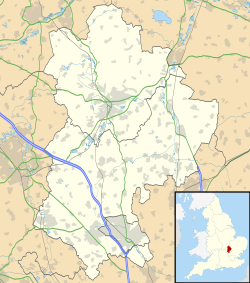Bushmead Priory facts for kids
| Monastery information | |
|---|---|
| Full name | The Priory Church of Saint Mary, Bushmead |
| Other names | Bissemede Priory |
| Order | Augustinians |
| Established | 1185/1195 |
| Dedicated to | Saint Mary |
| Site | |
| Location | Staploe, Bedfordshire, England |
| Coordinates | 52°14′01″N 0°22′03″W / 52.233611°N 0.3675°W |
| Visible remains | refectory and kitchen |
| Public access | yes |
Bushmead Priory, also known as The Priory Church of Saint Mary, was once a home for a special group of priests called Augustinian Canons. It was a monastic building located in Bushmead, a small area in Staploe parish, Bedfordshire, England. Today, what's left of this old building is a Grade I listed building, which means it's very important historically.
Contents
What is Bushmead Priory?
The remains of this 700-year-old priory are still standing today. They are near an industrial area and an old airfield, between the villages of Colmworth and Little Staughton.
What's Left of the Priory?
Sadly, nothing is left of the priory church itself. Most of the other buildings where the canons lived have also disappeared. Only the refectory (dining hall) and the kitchen remain.
Who Lived at Bushmead Priory?
Bushmead Priory was never a very large place. Usually, only the prior (the head of the priory) and up to four other canons lived there.
How Bushmead Priory Started
The priory was founded around 1195 by William, who was a chaplain (a type of priest) from Colmworth.
Early Gifts and Land
Hugh de Beauchamp from Eaton Socon gave the priory about 28 acres of land. The priory also owned land near Coppingford chapel. In these early years, many local people gave land to the priory as gifts of faith. Around 1206, King John allowed the canons to fence off and clear part of the nearby Perry woods.
Becoming an Augustinian Priory
After William died in 1215, Joseph, another chaplain, became the head of the community. Under his leadership, the house officially became an Augustinian priory. The Augustinians were a new type of religious order at the time. They were priests who lived together in a community, similar to monks.
Life at the Priory
Over the years, the priory grew thanks to many gifts and grants. The canons wrote down details of their daily lives and important events in special books called Cartularies. These books were like records or diaries. Unfortunately, very few of these old records have survived over the centuries.
A Dispute Over Gifts
It was common for monasteries to receive generous gifts. However, sometimes family members of the givers would not be happy about these gifts. One such person was John Pateschull. He was upset about a gift of money from his grandfather's will. After a long argument, he even had the priory's cattle taken away!
Richard of Staughton, a senior canon and later the prior of Bushmead, went to get the cattle back. But John Pateschull's men captured and imprisoned him. The argument was finally settled through a special agreement.
A School That Never Was
When Richard of Staughton became prior, he got permission from the bishop to start a boys' school. However, it is believed he died during the time of the Black Death (a terrible plague) before he could start the school. Robert Tychemerssh was the prior in 1418.
Changes to the Priory Over Time
The priory's history changed a lot after King Henry VIII ordered the Dissolution of the Monasteries. This meant many monasteries in England were closed down.
New Owners and Disputes
After Bushmead Priory was closed in 1536, there was a disagreement over who would own it. The St. John family and Sir William Gascoigne both wanted the land. King Henry VIII waited until 1537 before allowing the priory to go to Sir William.
Building a New Home
Fifteen years later, in 1562, a man named William Gery bought the estate. He quickly started building a new house on the priory site. About a hundred years later, Richard Gery made the site even bigger, creating a large mansion. This mansion has since been taken down.
Architectural History
Many changes have been made to the priory building over time. For example, a new floor and windows were added around 1500. You can still see the different changes and repairs that have happened, which gives an interesting look into its architectural history. The building is a rare example of King post and timber frame roof design.
Visiting Bushmead Priory
Today, Bushmead Priory is looked after by English Heritage. It is open to the public on weekends during the spring and summer months.
Burials
- Henry of Braybrooke
 | Jewel Prestage |
 | Ella Baker |
 | Fannie Lou Hamer |


